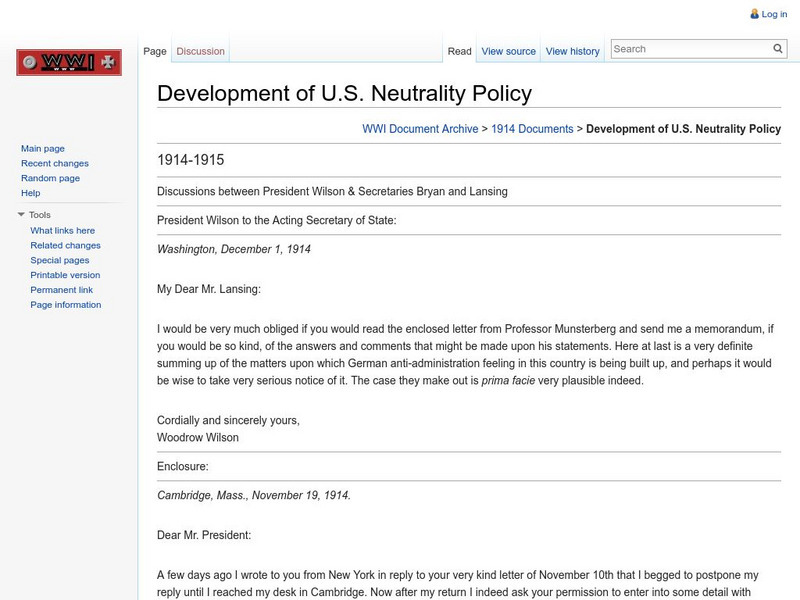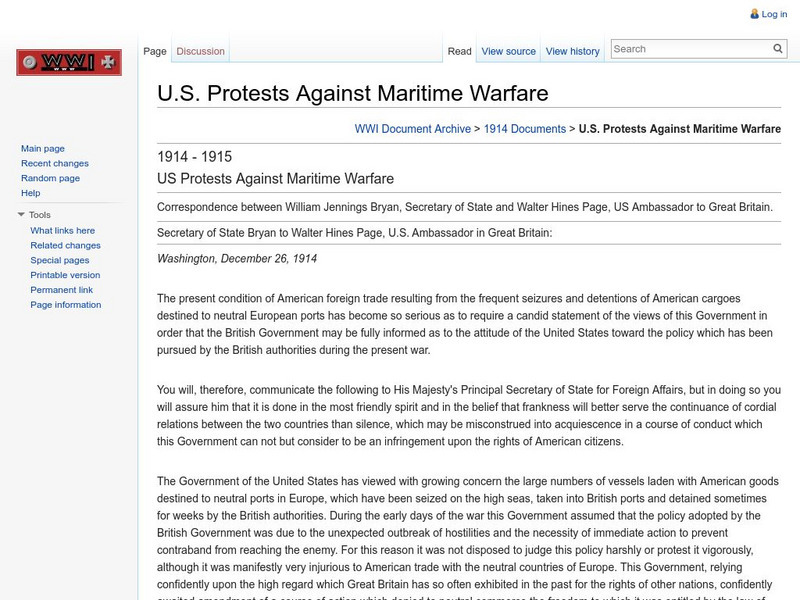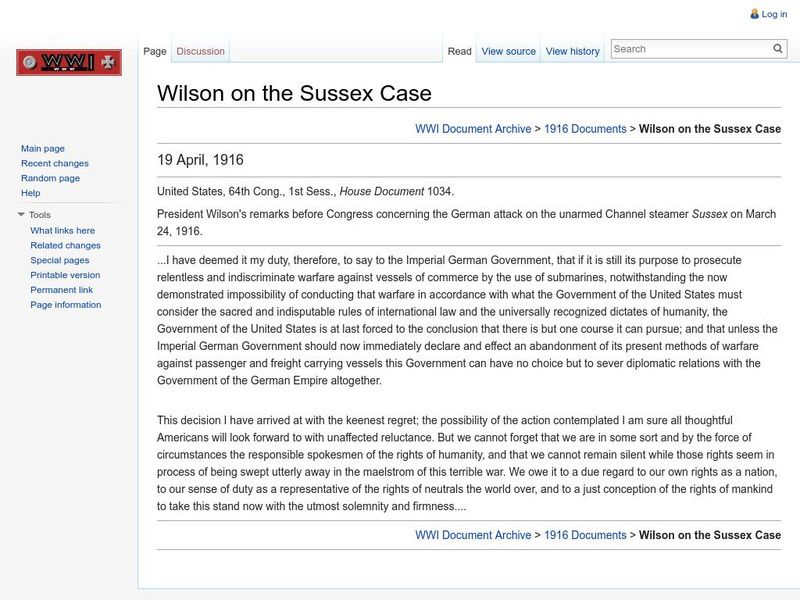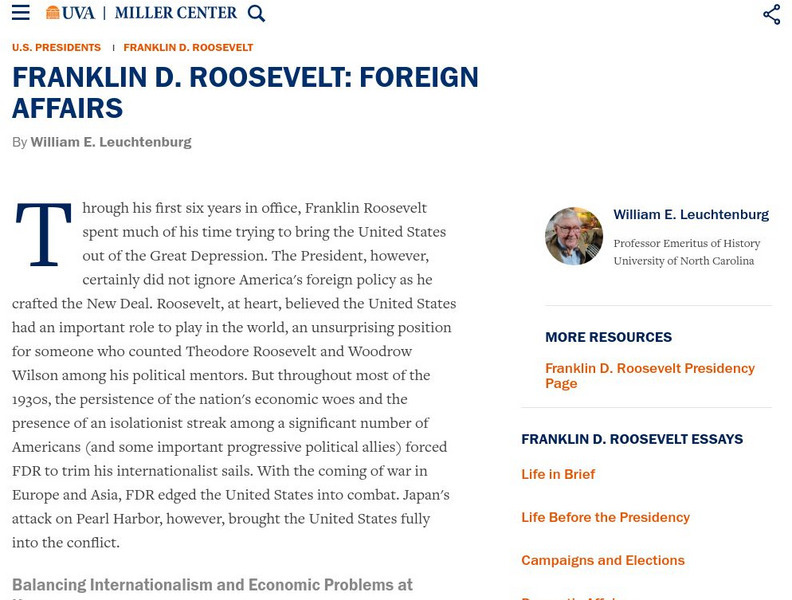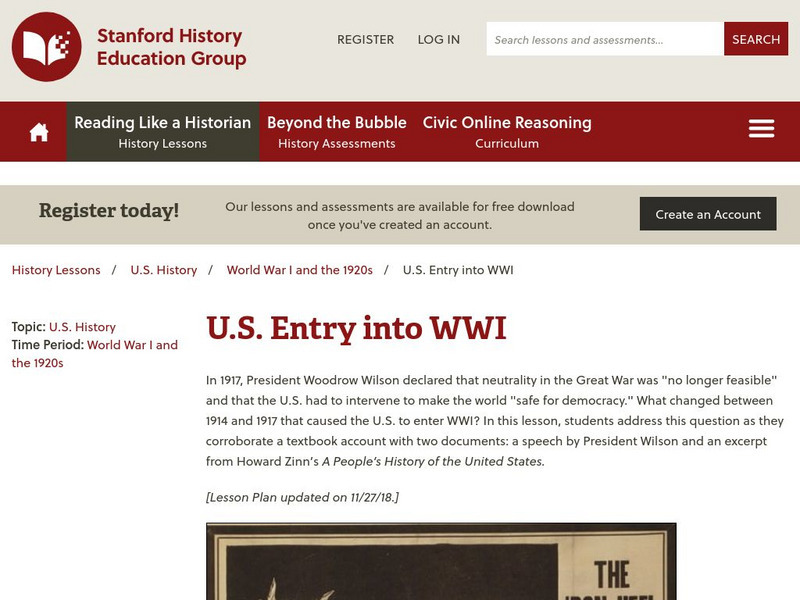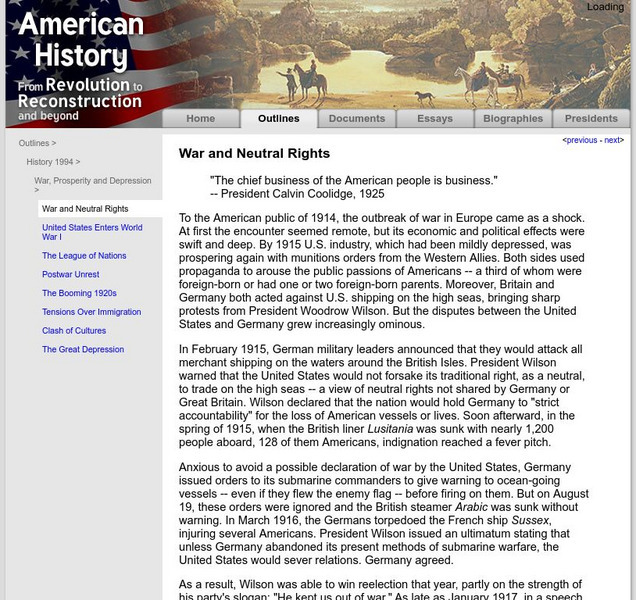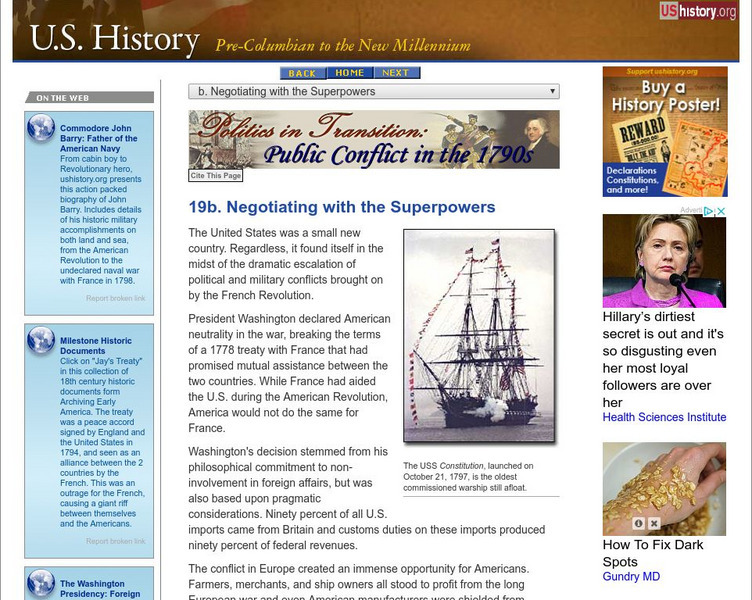ibiblio
Ibiblio: Ww Ii Resources: Shoot on Sight Speech Regarding Attack on Uss Greer
German U-boat attacks made it increasingly difficult for the United States to maintain its neutrality in World War II. Read Franklin D. Roosevelt's speech given on September 11, 1949, in response to the German attack on the US destroyer,...
National Endowment for the Humanities
Neh: Edsit Ement: Woodrow Wilson and Foreign Policy
A thorough review of Woodrow Wilson's foreign policies in these four lessons offered by EDSITEment. Learn the origins of "Wilsonianism," Wilson's views on relations with countries in Latin America, Wilson's decision to enter World War I,...
National Endowment for the Humanities
Neh: Edsit Ement: Woodrow Wilson and American Entry Into Ww I
This lesson plan explores the ways President Woodrow Wilson tried to keep America out of war as World War I raged in Europe. Examine documents, speeches, and other primary sources to follow America's path from neutrality to war.
Digital History
Digital History: Jeffersonians in Office [Pdf]
This is a great overview of both the Jefferson Administration and the Madison administration. Read about the Louisiana Purchase, trade problems, the War of 1812, and the downfall of the Federalists. A great resource. [pdf]
Brigham Young University
Brigham Young Univ.: Wwi Document Archive: Development of u.s. Neutrality Policy
Correspondence of two Secretaries of State in 1914 and 1915 outlining America's neutrality and the ways it is being demonstrated to countries in Europe.
Brigham Young University
Brigham Young U.: Wwi Document Archive: u.s. Protests Against Maritime Warfare
Series of letters from U.S. Secretary of State William Jennings Bryan protesting British interference with neutral U.S. merchant ships, and a lengthy response from the British government.
Brigham Young University
Brigham Young University: World War I Document Archive: Wilson on Sussex Case
President Wilson's remarks before Congress concerning the German sinking of the unarmed Channel steamer Sussex on March 24, 1916.
Chicago History Museum
Encyclopedia of Chicago: World War I
World War I brought turmoil to Chicago because of its large immigrant population, especially Germans. Read about how the war affected the politics and industry of Chicago both during and after the war.
OpenStax
Open Stax: Great War 1914 1919: American Isolationism and European Origins of War
The foreign policy of Woodrow Wilson is explained, and how he tried to keep America neutral at the start of World War I yet intervened in international affairs in the Western Hemisphere. The reasons America declared war on Germany in...
OpenStax
Open Stax: World War Ii 1941 1945: Origins of War: Europe, Asia and United States
Examines the conditions that fostered the rise of Fascism and Nazism, the events during the lead-up to the outbreak of war, and what Roosevelt did to help affected nations yet still keep the United States neutral.
University of Virginia
Miller Center at Uva: u.s. Presidents: Franklin Delano Roosevelt: Foreign Affairs
Scroll through this discussion of Franklin Roosevelt's attention to foreign policy during his several terms in office to "Confronting Germany and Japan" and "Descent into War." Here you will find out about the United States' position of...
Stanford University
Sheg: Document Based History: Reading Like a Historian: u.s. Entry Into Wwi
[Free Registration/Login Required] In this historical inquiry lesson, students address the question, "What changed between 1914 and 1917 that caused the U.S. to enter WWI?" to corroborate a textbook account with two documents: a speech...
World War 1
Worldwar1.com: Great War Society: Relevance: America's Turn From Neutrality to Intervention
Essay discussing the events that influenced the U.S. to change its foreign policies during the years of 1914 to 1917. (Published Spring 1992, revised May 24, 1996)
University of Groningen
American History: Outlines: War and Neutral Rights
This resource presents a brief discussion of U.S. neutrality early in World War I and of the events which brought the country closer to war.
Digital History
Digital History: Neutrality and the Lusitania [Pdf]
American neutrality in World War I was sorely tested with the attack and sinking of the passenger ship, Luisitania. Read information about the attack and find conflicting reactions by Franklin Roosevelt and William Jennings Bryan about...
Brigham Young University
World War I Document Archive: Woodrow Wilson's Declaration of Neutrality
This is the text of the original 1914 Declaration of Neutrality of President Woodrow Wilson.
National Endowment for the Humanities
Neh: Edsit Ement: From Neutrality to War: The United States and Europe, 1921 1941
In this Curriculum Unit, students will consider "From Neutrality to War: The United States and Europe, 1921-1941" in 4 Lessons. The unit also includes worksheets and other student materials that can be found under the resource tab.
Yale University
Yale New Haven Teachers Institute: The Foreign Policy of Franklin D. Roosevelt
Describes Roosevelt's policies towards Pan-America, involvement in the global conflict, and entry into World War II. Included are sample lessons and a bibliography. (Published in 1978)
Tom Richey
Tom Richey: American Neutrality (The u.s. And the European War)
A detailed PowerPoint reviewing the neutral position the United States held at the beginning of World War II.
Mount Holyoke College
International Relations: American Protest Over the Sinking of the Lusitania
Text of a statement by William Jennings Bryan protesting the sinking of the Lusitania by German U-boats.
Independence Hall Association
U.s. History: 1930s Isolationism
Read about the ways the American government and people looked inward during the 1930s, isolating themselves from actions taking place in Europe and Asia.
Independence Hall Association
U.s. History: The Road to Pearl Harbor
A brief overview of the decade prior to the American entrance into World War II. Read about the rise in militarism in both Europe and Japan.
Independence Hall Association
U.s. History: Negotiating With the Superpowers
Read about the problems President George Washington had with foreign affairs. Both France and Great Britain ignored American sovereignty and claims of neutrality. Read about Great Britain's disregard of the Treaty of Paris which ended...
Oregon Secretary of State
Oregon at War: Before the War America's Strained Neutrality
Read about the attempts of the United States to remain neutral during World War I raging in Europe. Find out what finally made U.S. entrance into the war inevitable.


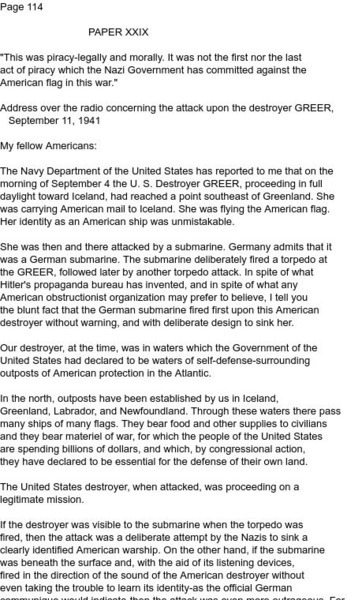

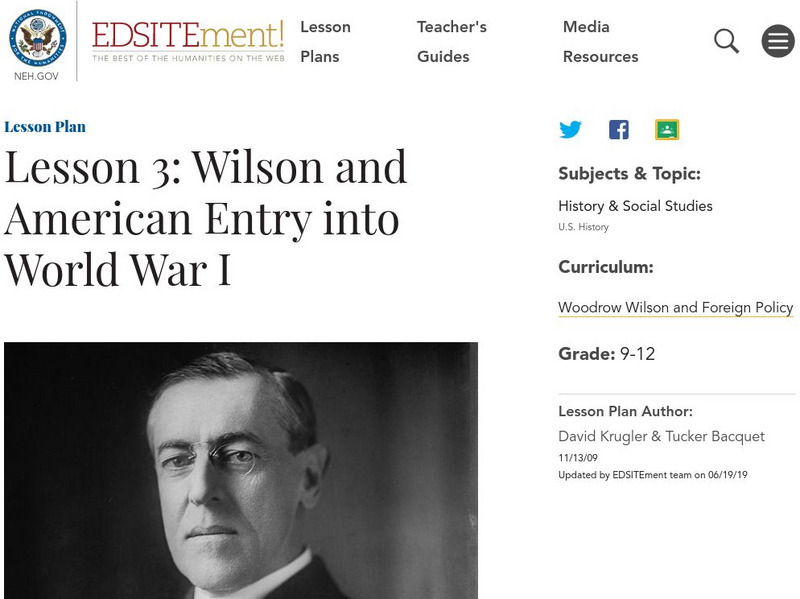
![Digital History: Jeffersonians in Office [Pdf] Website Digital History: Jeffersonians in Office [Pdf] Website](https://d15y2dacu3jp90.cloudfront.net/images/attachment_defaults/resource/large/FPO-knovation.png)
